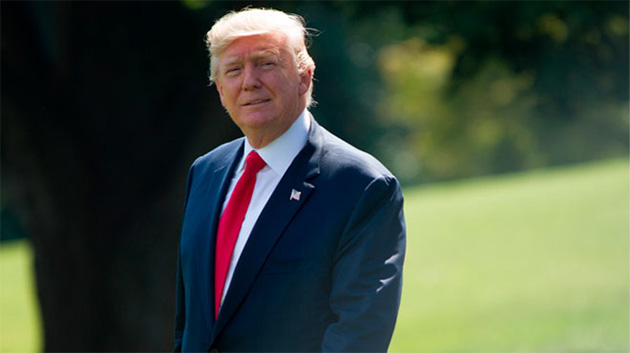Trump’s Tariffs Are Not Protectionist
Key points in this article:
- China’s dumping threatens national security
- Countries won’t grow stronger through a fundamentalist approach to free trade
- The U.S. public and economists question the effectiveness of free trade fundamentalism
U.S. president Donald Trump officially announced tariffs on steel and aluminum imports. He has implemented a 25% tariff on steel and a 10% tariff on aluminum, which will take effect from the 23rd of March.
The tariffs were originally intended for all countries as a countermeasure to China’s imports that were entering via other countries, but the final decision excluded imports from Canada and Mexico from the tariffs.
Other allied countries such as Japan may also be exempted, depending on how discussions on security and trade turn out. The tariffs are based on Section 232 of the Trade Expansion Act of 1962.
Trump also announced a plan to introduce a mirror tax, under which the U.S. will levy an import tax that equals a trading partner’s import tax. For example, if China imposes a 25% import tax on U.S. automobiles, the U.S. can also impose a 25% import tax on Chinese automobiles.
At the signing ceremony for the tariffs, Trump explained that the American steel and aluminum industries were often attacked by dumping. “Now we’re finally taking action to correct this long overdue problem,” he said.
A worker from the industry who was present said, “My father, during the 80s, he lost his job due to imports coming into this country . . . it impacts you, it’ll never leave you”.
The U.S. media, however, is showering Trump with criticism about the import taxes. Even the conservative media is being critical. Many criticize Trump for being “protectionist” and assert that he is withdrawing the U.S. from world leadership.
The question is, is this view correct?
China’s Dumping Threatens National Security
According to White House reports, employment in the U.S. steel industry has dropped by 54,000 people since the year 2000 and employment in the aluminum industry has dropped by 40,000. The six main aluminum refineries are slowly closing down.
Aluminum is used on a huge variety of weaponry and aircraft. Steel is used for military equipment used by the Green Berets, such as submarines, tanks and LAVs. This means that aluminum and steel are vital to national security. If these U.S. industries die out due to Chinese imports, the U.S. would no longer be able to manufacture their own weaponry.
Ever since Deng Xiaoping’s reforms, China has invested 70% of its GDP into reinforcing its production system to develop low-cost manufacturing. It continues to strengthen export power and has created a ‘state-level dumping system’.
As a result, according to the U.S. Department of Commerce, China’s steel market, which represented 20% of the world’s steel market in 2000, rose to 60% by 2015.
Ever since China joined the WTO in 2000, the U.S. and Europe have implored them to follow the rules, but China has never kept its promises to do so.
During his presidency, Obama turned a blind eye to this problem in the hope of avoiding conflict, but that simply resulted in more jobs were being taken around the world due to China’s dumping. We are now on the verge of seeing the destruction of capitalism.
Trump is trying to use his leadership abilities to solve a problem that arose from an absence of political willpower.
No Power Comes From Free Trade Fundamentalism
Trade cannot work if one country buys from another, but the other country does not buy from them. It also doesn’t work if the two countries don’t play by the same rules and unfairness arises. This happens when a country, like China, can control the value of their currency.
The problem becomes a global issue when China takes the money it makes from its huge trade surpluses with the U.S. and uses it on nuclear missiles and building manmade islands with military facilities so it can invade other countries.
Free trade fundamentalists think that Trump’s policy is protectionist, but in fact there is nothing to guarantee that absolute free trade will make the country stronger.
In 1791 Alexander Hamilton, one of America’s Founding Fathers, expressed the following ideal: “To endeavor by the extraordinary patronage of Government, to accelerate the growth of manufactures, is in fact, to endeavor, by force and art, to transfer the natural current of industry, from a more, to a less beneficial channel”.
We can see from this that the U.S. adopted a protectionist policy at the time of its founding. Protectionist policies rebuilt the nation on many occasions, including after WWI, when, despite emerging victorious, the U.S. chose not to join global alliances but instead focused on accumulating national power.
Examples like this are not confined to the U.S. alone. Japan’s rapid post-WWII growth was not due to absolutely free trade but a result of the construction of state-endorsed industries and selling its goods to the U.S.
History proves to us that free market fundamentalism is not the key to making a powerful country.
U.S. Public And Economists Question Free Trade Fundamentalism
In contrast to the media giants in the U.S., much of the public is actually against free trade.
A Public Religion Research Institute survey from 2016 shows that only 33% of white laborers thought free trade was beneficial because it offered better goods for lower prices, and 60% thought free trade was harmful because it took away jobs and lowered the currency.
Free trade supporters who advocate for globalism admit that it causes damage to people in the short-term, but claim that all people benefit from it in the long-term. So far, no one has been able to prove this point.
Economist Paul Samuelson believed that out there somewhere was a group who would suffer from reduced income in the long-term from free trade. He denies the free traders’ claim that free trade is beneficial to everyone in the long-term. A victim of this kind of thinking is the father of the aforementioned man who lost his job in the 80s.
The reason why free-trade is not benefiting everyone lies in the business practices that China engages in, which are completely foreign to the U.S.
In China there are no labor laws or environmental standards like those that apply in developed countries. This makes low-cost production possible under a low currency. The U.S. must compete with China under disadvantageous conditions, and the fairness of those conditions is highly worth debating.
In general, consumers are, first and foremost, laborers. During times of low inflation people are not happy because things get cheaper; they’re unhappy because they lose their jobs and wages do not increase. This is natural because working is directly related to human dignity, whereas consuming is not.
At the center of Trump’s policy is a JFK-esque ‘Workfare not Welfare’ idea. The media with the ‘protectionist’ labels on Trump are only seeing people as consumers, and fail to see that employment is in fact the greatest form of social welfare.
China Must Grow Into A Developed Country
China is flustered by Trump’s moves on tariffs. The U.S. has a global trade deficit of USD796.2 billion and 47% of that, or USD375.2 billion, is from trade with China.
On the 7th of March, the Wall Street Journal reported that the Trump administration asked China to make an import plan to cut the trade deficit by USD100 billion. This would reduce the U.S-China trade deficit by 25%.
In one sense this is a message to China. Trump is telling them “if you want economic growth, it is better to expand domestic consumption than to bombard other countries with your exports. You will only enter the league of developed countries if you grow domestic consumption”.
The Chinese government cannot initiate this increase in domestic consumption because it would create a real estate bubble. It has to be an expansion of consumption by the people.
For China to change its economic approach, however, a radical change to its entire economic system could be needed. A consumption-centric society must be democratic. It must listen to the voices of the less powerful majority.
In recent years it has become increasingly clear that China has been using its trade revenue on military expansion. Trump’s tariffs have the additional purpose of defeating China’s ambitions without having to fight them.
In December 2016 Master Ryuho Okawa, founder and CEO of Happy Science, spoke about Trump’s genius in the following way:
“We need to grab the source of China’s profit, and create a system that stops it from earning foreign currency. The Chinese Yuan is loose and fluctuating so we have to ‘string it up’ and bring it to an appropriate value. That way China will no longer be able to control its value. This idea is based, not on equality, but on ‘what is fair’.”
“This idea has not gained common acceptance around the world, but what I can tell you is that there’s nothing wrong with Trump. In fact his ideas have a spark of genius.”
China was dealt a blow from the U.S. tax cuts passed in December. American companies are now withdrawing from China. Xi Jinping will probably sustain his dictatorship to prevent the next U.S. ‘trade attack’ from toppling the Chinese economy.
But China must think about buying instead of selling if it wants to enter the guild of developed nations and become a world-class leader. Also, Japan must follow the Trump administration’s lead by passing tax cuts to recall Japanese companies and stop China’s military expansion.
(Hanako Cho)



















